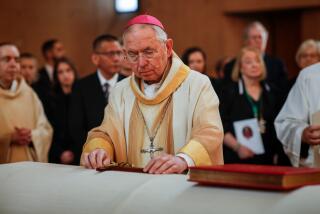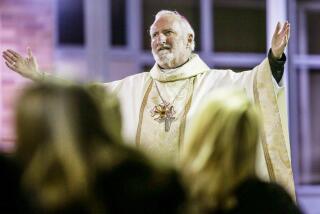The Great Dan A BIOGRAPHY OF DANIEL O’CONNELL by Charles Chenevix Trench (Merrimack: $18.95; 345 pp.)
- Share via
Daniel O’Connell was one of the great political figures of the 19th Century. His impact was not confined to Ireland. In the English House of Commons, he helped to establish the principle of democracy and also to gain voting rights for the Jews.
In Ireland, he is still known and venerated for his tireless labor in the cause of Catholic emancipation and of repeal of the Act of Union (1801). He was successful only in the first of these objects. The Union of Great Britain and Ireland continued in force until the Irish war of independence of 1916-’22, and was abolished then by methods of which O’Connell would have thoroughly disapproved. He always maintained that freedom was not worth the loss of a drop of blood. He is frequently blamed for not urging the peasants to fight during the great famine of 1847, when they allowed themselves to be virtually exterminated without protest.
In a new biography, one might reasonably expect a reassessment of O’Connell’s place in history. Unfortunately, this one is marred by failures to see him in his own context. For instance, the author’s view of O’Connell’s use of the Irish language shows a lack of essential knowledge. His knowledge of that language, the only language of a great many of the poor people who gave him their support, was one of his strengths, a natural asset. He would never have thought of it as “a patois useful for communicating with servants.”
Inaccuracies of a factual nature are more serious: The poet Eileen O’Connell was Daniel O’Connell’s aunt, not his grandmother; the few remaining poets who were writing in O’Connell’s lifetime were not “flattering the Colonels or anyone else who would give them a meal and a dram as though they were Cuchulain or Brian Boru”; the Rev. Tresham Dames Gregg is misnamed Clegg (no misprint--the name occurs twice on p. 271 and is repeated in the index); Thomas Davis was 29, not 39, at the time of the formation of Young Ireland (he died at 31); John Mitchel came from Newry, not Belfast; and so on. Small points, but there are too many of them, and they undermine one’s faith in the book as a whole.
More to Read
Sign up for our Book Club newsletter
Get the latest news, events and more from the Los Angeles Times Book Club, and help us get L.A. reading and talking.
You may occasionally receive promotional content from the Los Angeles Times.










